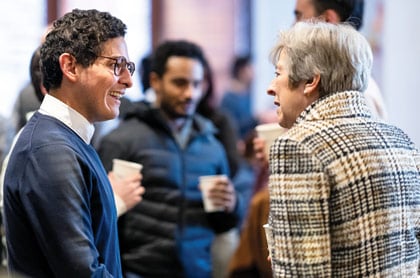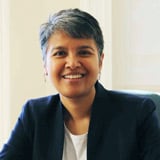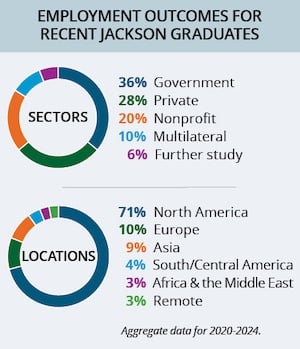Gain the Edge: Graduate Programs for Careers Tackling Global Challenges
Yale University, Jackson School of Global Affairs
A Focus on Foundational Skills and Cohort-Based Learning and Collaboration

The two-year Master of Public Policy (MPP) program at Yale University’s Jackson School of Global Affairs prepares students for successful policy careers through the intentional blend of disciplines and small, collaborative cohorts.
The program offers a Core curriculum, on top of which students have a high level of flexibility to develop their own academic path according to their specific global policy interests. The Core focuses on economics, history, political science, and quantitative analysis. Collectively, the Core courses aim to instill “discipline-specific paradigms and skills, as well as to help students appreciate the overlap across the fields,” explains Jennifer Gandhi, deputy dean of the Jackson School. “Each of these disciplines offers different sets of tools and frameworks through which one can see and understand the world.”
In the “History and Global Affairs” course, for example, students are presented with a concept like citizenship or security, and asked to examine its meaning in the context of a specific historical case study to understand how history can be used as a guide or warning in policymaking. “Economics for Global Affairs,” in turn, introduces students to canonical arguments related to globalization and development and to data analysis useful in evaluation.

“We see our students being in a better position to formulate, implement, and evaluate policy because they can leverage the concepts, ideas, and empirical approaches offered by economics, history, and political science.” –Jennifer Gandhi, Deputy Dean and Professor, Jackson School of Global Affairs, Yale University
Having a shared foundational base of knowledge enables students to think critically about the “big questions” facing global affairs professionals — such as the impact of international migration or the relationship between globalization and inequality — and gain deeper insights from future coursework, regardless of the focus area they pursue. “Appreciation of these questions — what is at stake, how they have been addressed, why they are still important — provides a frame upon which students can build when they take more advanced courses or courses with practitioners,” Gandhi says.

To help bridge the gap between theory and practice, the Jackson School brings academics and policymakers together to lead talks, seminars, and courses. “We attempt to create a unique intellectual space for students where they can see academic and practitioner viewpoints and concerns intersect,” Gandhi says.
Cohorts at Jackson are small by design, ranging from 30 to 40 students. Classes can thus focus on collaborative projects that not only bolster learning and connections but prepare students for a field where teamwork is essential.
Jackson students work with an assigned faculty advisor, the assistant dean of graduate studies, and other mentors, like Senior Fellows, to tailor their curriculum beyond the Core to their needs and interests, drawing from courses across Yale’s 13 professional schools. This flexible approach enables MPP students to build upon their foundational knowledge and develop a skill set that aligns with their personal career aspirations.
Yale University, Jackson School of Global Affairs
https://jackson.yale.edu/careers
[email protected]
203-432-6253![]()
Contents
- Gain the Edge: Graduate Programs for Careers Tackling Global Challenges
- Thunderbird School of Global Management at Arizona State University
- University of Pittsburgh, School of Public and International Affairs
- Johns Hopkins University School of Advanced International Studies
- The Fletcher School at Tufts University
- Georgetown University, School of Foreign Service
- George Mason University, Schar School of Policy and Government
- University of Denver, Josef Korbel School of International Studies
- Indiana University, Hamilton Lugar School of Global and International Studies
- University of Toronto, Munk School of Global Affairs and Public Policy
- Yale University, Jackson School of Global Affairs
- Seton Hall University, School of Diplomacy and International Relations